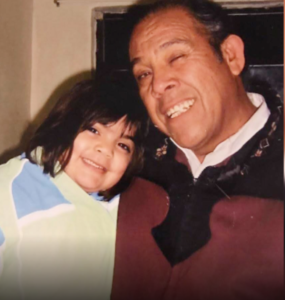
BY FRANCISCO GUAJARDO
Eighteen-year-old Hope Guerrero from Weslaco wanted to tell her grandfather’s story, so she emailed the Museum of South Texas History.
“My grandfather died from COVID on July 12, 2020, and I just felt there’s a lot of disbelief in the community about the reality of COVID,” Hope said in the e-mail. “My grandfather is testament that it is real, and I don’t want others to feel the pain we’ve gone through, so I wanted to tell his story.”
Hope exudes the wisdom of an elder when she talks about her grandfather José Moreno, who was born April 30, 1949, in Piedras Negras, Coahuila. She bore close witness to a man she describes as a kind-of borderlands Renaissance man, someone who showed mastery as a musician, carpenter, pastor and farmworker.
José’s daughter Sylvia also bore close witness to her father.
“My father drew musical inspiration from his mother, my grandmother,” Sylvia said. “He was a musician from a young age and could play many instruments.”
Sylvia added that José learned carpentry from his father.
“My dad learned how to be an albañil . He learned carpentry, how to lay brick, and how to build a home,” she said.
From the time the family landed in South Texas, José followed the migrant labor stream, because he had to provide for his family.
“When he went up north, he worked in the fields and he also helped build homes for people,” Sylvia recalls. “He was always doing things.”
“My father was guided by his faith, so he built his own church and became the pastor of a church he named Casa de David,” Sylvia added. “The family helped build the church, but my father led the effort. He named it after David, because of the Biblical references to David and music.”
A man inspired by muses, José found Casa de David as the place where his passions came together, and he used the church to evangelize and to work for the public good.
“He often came out on the radio during the ‘Predicando a las Naciones’ program on Radio Vida,” Sylvia said.
On those occasions, José used a harp to spread the word of God. Sylvia and Hope describe him as a man of words, music and faith.
“He was always there for others,” Sylvia said. “And that’s why it was so hard to let him go to the hospital when he contracted the virus. When he checked into DHR, that was it, and we could not be there for him anymore. It hurts so much that he was there for everyone, but no one could be there for him.”
Sylvia speaks of her personal pain.
“I just wish I had a little more time to be with my dad. This just happened too fast,” she said.
But she also observes the community pain.
“After we buried my father, I visited his graveside often, and I noticed a lot of people were dying: 16, 18, and 20 year olds were dying, and they were mostly COVID deaths,” she said.
“My grandfather was a special man,” Hope said. “And I just want people to take this thing seriously.”
Que en paz descanse José Moreno.
Francisco Guajardo, chief executive officer for the Museum of South Texas History at 200 N. Closner Blvd. in Edinburg, authored this story as part of an ongoing series entitled Bearing Witness. The museum’s effort aims to document some of the Rio Grande Valley lives lost to COVID-19. For more information about the museum, visit MOSTHistory.org.



